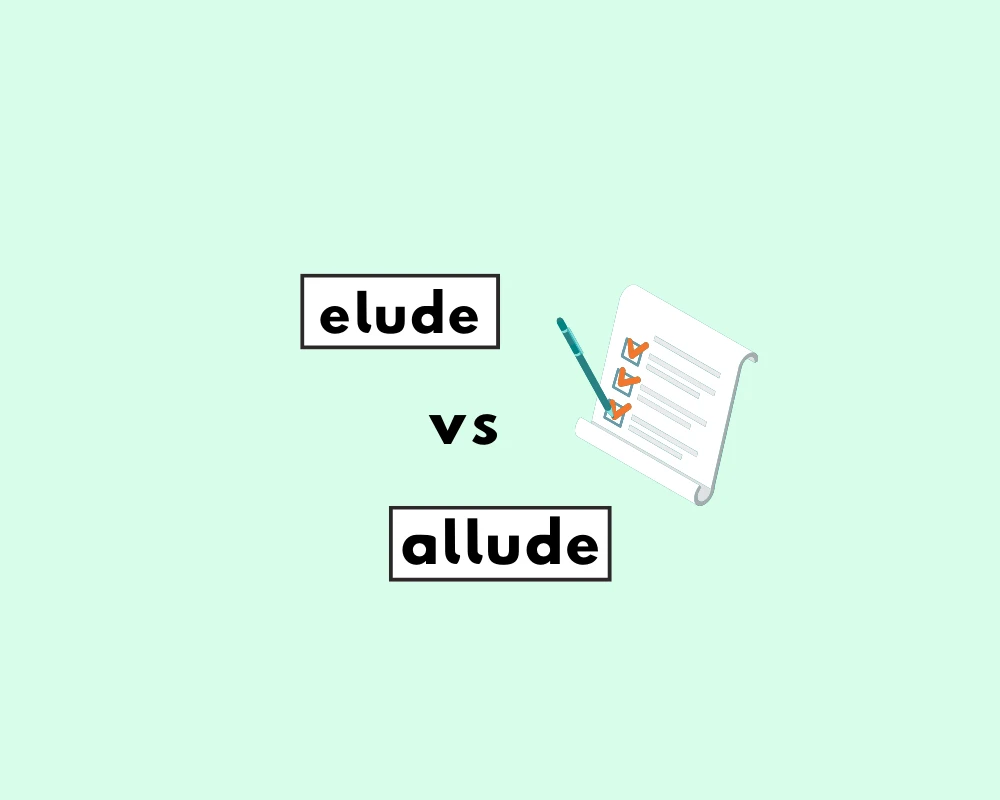
Elude vs allude
The wily thief tried to elude the security guards by blending into the crowd.
Her latest novel subtly alludes to events from her childhood, though she never explicitly states them.
The detective tried to allude the truth from the reluctant witness.
His vague statements only seemed to elude to a deeper conspiracy.
For today’s lesson, let’s look at a commonly confused pair of homophones: elude and allude. What’s the difference between these words, and what’s their correct use in writing?
What do “elude” and “allude” mean?
To elude is a verb that means to “evade or escape from (a danger, enemy, or pursuer), typically in a skillful or cunning way: he managed to elude his pursuers by escaping into an alley.” Elude is similar in meaning to avoid, escape from, or evade.
Allude is also a verb, and means to ‘make an indirect reference: comments alluding to an earlier discussion.’ In this way, when we allude, usually towards something, it’s similar to insinuate, hint at, or imply.
| Sentence with ‘elude | Sentence with ‘allude’ |
| He thought he would elude the police for weeks. | Her comments allude to a preference for earlier forms of art. |
The history of allude and elude
When in doubt, look to the language of origin. While elude and allude are both verbs, this is not all they have in common: both derive from the Latin root word, ludere, meaning “to play”. The prefix for elude is ex– “out, away”. When attached to the root word (ludere), we get out + play, which is close in meaning to elude.
The prefix for allude, ad– “to, toward”, when paired with the root word ludere means “to play” + “toward, to”. In other words, to play towards something, i.e., hint at or suggest. Both words describe a playful avoidance or evasion of a kind, but in a different manner.
“Allude” / “elude” in sentence examples
| Examples: “allude’ used in sentences |
| She subtly alluded to her upcoming surprise without giving away any details.
The author’s clever wordplay in the novel allowed her to allude to historical events without explicitly mentioning them. His comment seemed to allude to a secret that only a few people were aware of. The painting contained hidden symbols that alluded to the artist’s personal struggles. During the lecture, the professor would often allude to famous philosophers to support his arguments. |
| Examples: “elude’ used in sentences |
| The clever criminal managed to elude the police by using a network of hidden tunnels.
Despite hours of searching, the answer to the riddle continued to elude them. The butterfly’s delicate beauty seemed to elude capture as it flitted from flower to flower. The secret code proved to be so complex that even the best cryptographers couldn’t elude its meaning. The athlete’s graceful movements allowed him to effortlessly elude his opponents on the field. |
“allude” and “elude,” associate “allude” with “indirectly referencing” (like a subtle allusion) and “elude” with “evading” (like escaping from something).
Allude, synonyms
Elude, synonyms
- evade
- avoid
- dodge
- flee
- escape from
- slip away from
- shake off
- eschew
The origin of elude & allude
1530s, “delude, make a fool of,” from Latin eludere “finish play, win at play; escape from or parry (a blow), make a fool of, mock, frustrate; win from at play,” from assimilated form of ex “out, away” (see ex-) + ludere “to play”.
1530s, “to mock” (transitive, now obsolete), from French alluder or directly from Latin alludere “to play, make fun of, joke, jest,” … “to” (see ad-) + ludere “to play” (see ludicrous). The meaning “make an indirect reference, point in passing” is from 1530s.
In review: elude vs. allude
- Elude generally means to escape or avoid something skillfully, to evade or evade capture, or to fail to be understood or grasped.
- Allude means to suggest or indirectly reference something, often without explicitly stating it.
Read about other confusing words
Work Sheet
Based on the post, what is the primary meaning of the verb ‘elude’?
According to the post, what does the verb ‘allude’ mean?
Which sentence correctly uses ‘elude’ based on the examples provided?
Which sentence correctly uses ‘allude’ based on the post’s explanation?
What is a key difference between ‘allude’ and ‘elude’ according to the post?
The criminal attempted to ______ the police blockade.
During his presentation, he would often ______ famous studies in the field.
The full meaning of the cryptic message continued to ______ the decode team.
She decided to ______ her personal struggles through her art rather than speaking about them directly.
The suspect was able to ______ capture for weeks.
Frequently Asked Questions
What does ‘allude’ mean?
+
What does ‘elude’ mean?
+
What is the difference?
+
When is ‘allude’ used incorrectly?
+
When is ‘elude’ used incorrectly?
+
Yash, D. "Allude vs. Elude (Definition & Examples)." Grammarflex, Jun 15, 2025, https://www.grammarflex.com/elude-vs-allude-the-difference-examples/.
Sources
-
Oxford languages elude. Accessed on August 11, 2023. Harper, Douglas. “Etymology of elude.” Online Etymology Dictionary, https://www.etymonline.com/word/elude. Accessed 12 August 2023. Harper, Douglas. “Etymology of allude.” Online Etymology Dictionary, https://www.etymonline.com/word/allude. Accessed 12 August 2023.











